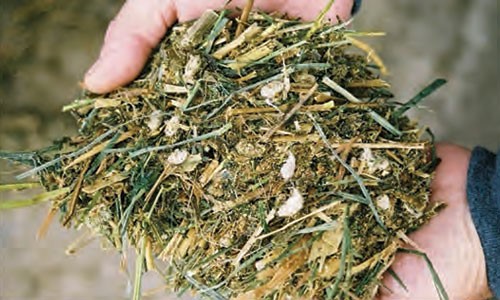Whole Cottonseed- A Super Dairy Cow Feed
Whole Cottonseed(WCS) has energy, protein, and fibre in greater concentrations than many other feedstuffs. That is why it is recognized by dairy producers worldwide as a cost-effective premier feedstuff for lactating cows of high genetic merit. In fact, more than 50% of the annual supply of whole cottonseed is consumed by dairy cattle. Producers have found that whole cottonseed is ideal for mixing with less nutrient-dense feed ingredients. The result is a competitively priced, balanced ration.
 Will Cottonseed Work for You?
Will Cottonseed Work for You?
Dairy producers of all sizes can effectively use whole cottonseed (WCS), especially in the diet of the early-lactation cow. WCS can increase milk output and boost butterfat. WCS is convenient and does not need to be processed before feeding. Since WCS should be mixed with other components of the dairy cow diet, producers with large herds buy WCS in bulk and add it to their total mixed ration (TMR). Small herd owners can ask their feed supplier to include it in their pre-mix or blend.
High Energy and High Fibre
Whole cottonseed has high protein (23%), high energy in the form of fat (20%), and crude fibre (24%) on a dry matter basis. Compared with other commonly available protein supplements, whole cottonseed is the only one with both additional high energy and high fibre. This combination is especially attractive when feeding the high producing, early lactation dairy cow in negative energy balance – a cow in need of both energy and fibre. Also, the energy (fat) content of WCS makes it a valuable addition for cows under heat stress who may have a reduced appetite.
WCS has a value like a 20% protein mixture of wheat and soybean meal, making it worth around £300/t with current feed prices. As a relative feed value to Wheat at £200/t processed and Soya at £380/t, its feed value is worth £380/t. Therefore its feed value is 25% higher than its market value. Whole cottonseed has a good balance of crude protein and energy, so it makes a complete supplement in many situations. The “crude protein” in WCS is “true protein” which makes it better for supplementing high forage diets compared to supplements with non-protein nitrogen (urea).
The energy in WCS is primarily from fat, which if fed at a reasonable level, will not interfere with forage digestion the way the starch in corn can. Research has also shown that the fat in WCS improves reproductive performance. Adding WCS to the diet of early-lactation dairy cows usually increases total energy intake, which often boosts milk yields. And WCS usually has a positive effect on milk fat test, while slightly reducing milk protein. One very important point in using WCS is a reduced number of feed ingredients – the high nutritional quality of WCS often reduces the total number of other feedstuffs needed in the ration. Thus, farmers require less ingredient storage and less management time spent with purchasing multiple ingredients.
Currently there is very little supply in the UK, but if there is enough interest my colleagues at DBL Buying Group would be happy to source it.
See how WCS can fit into your cow’s diet going forward by contacting Mark on 07984 785190 or e-mail markyearsley@fcgagric.com
Recent Articles
- Do You Know the Benefits of a Health and Heat Detection System?
- Have you Ordered Your Silage Inoculant?
- Growing More Grass With Less Nitrogen, Where Do I start?
- A Real Recognition of The Importance of Food Security or Simply A Reconciling of DEFRA Budgets?
- Silage Sheet Prices Available!
- Are Your Cows at Risk of Grass Staggers?
- Feed Late Afternoon and Calve in Daylight Hours!
- Q Fever
- Aerating Your Soil Without A Machine? – Gerard Finnan
- Why Are You Not doing a Soil Management Plan?


